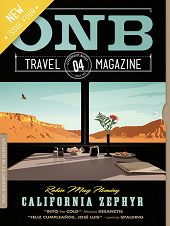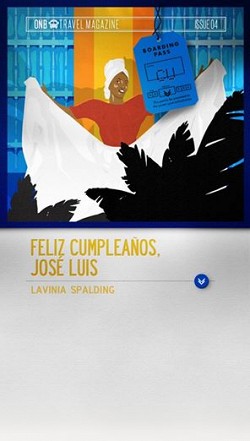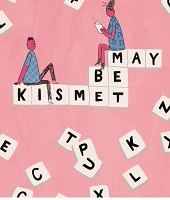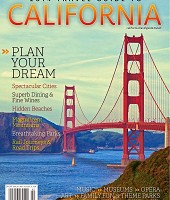
Overnight Buses: “Feliz Cumpleanos, Jose Luis”
by Lavinia Spalding (google+)It’s late afternoon, and Erin and I have occupied the sunny courtyard of La Canchanchara for hours, drinking cervezas and taking turns dancing with José Luis. Now he’s tutoring Erin on the güiro, a traditional Cuban instrument made from a hollow gourd. He leans close as he teaches her the rhythm, locking eyes with her, and in unison they scrape thin sticks over the carved ridges of their instruments: cha, cha, chachacha, cha, cha, chachacha. The band plays son, and the sweet smoke from his hand-rolled cigar encircles our heads. As the sun crosses the sky and we order another round, José Luis takes my hand and begins serenading me in Spanish, soft and low. I sing back. Across the table Erin grins: missions accomplished.
Four days ago she picked me up at the Calgary airport. “I’ve been in a foul mood for months,” she said, backing her car out of the snowy airport parking spot. “I promised Drew I’d come back with an attitude adjustment.”
Erin is my best friend, and Drew is her Canadian husband. We met him in an Australian backpacker bar ten years ago and shared a pitcher of beer, and within minutes I knew he would marry her. What I didn’t realize was that he’d whisk her away to the cold plains of Canada, after which the only way I’d ever see her would be to bribe her with sunshine.
“I’m sick of my job,” she said, driving us toward the spray-tan salon where we had appointments to turn our grayish skin bikini-ready. “And this weather isn’t helping.”
She looked sideways at me, apologetically, as if I might judge her. Erin and I had been friends for twenty-five years; if I didn’t judge her when she was our high school’s head cheerleader, it was unlikely to happen now.
“Don’t worry,” I said. “We’ll find you a new attitude.”
The last time we traveled together I drank so much Tecate with two guys named Miguel that at the end of the night I decided to sleep in my Subaru outside our rented casita. “Are you crazy?” she’d hissed, holding the car door open. “I am not letting you sleep in a car, alone, in the middle of Mexico.” Now, three years later, we were off to Cuba—Erin in search of a new attitude, me in search of a cure for the insult of turning forty. At least if we failed, we failed together.
Our flight to Cuba kicks off with two complimentary glasses of champagne, and following Erin’s announcement that it’s my birthday, two more appear. While she reads a guidebook, I study “See It and Say It in Spanish,” enlightening her occasionally with useful phrases like Caramba! Eso es ridiculo. No tengo un gorilla en casa. Inexplicably—alarmingly—she appoints me our official translator.
I have never in my life taken a Spanish lesson, and even if I had, my brain isn’t as absorbent as it once was. But I did bring this handy kindergarten-level language book, along with several Lonely Planet and Rough Guides, whose glossaries should at least add some practical vocabulary to supplement “See It and Say It in Spanish” gorillas, geraniums, radishes, and accordions.
In addition to the dried-up sponge in my head and other obvious indicators of age—gray hair, wrinkles, sunspots, flabby waistline, unforgiving hangovers—one area in which it’s clear that forty is old is when packing for a trip. Between the ever-expanding first-aid kit, ugly-but-comfy shoes, just-in-case jackets, healthy snacks and emergency provisions, guidebooks and back-up documents, packing has turned complicated. In my twenties I could squeeze three weeks in Vietnam and Cambodia into a tiny zip-on daypack. Now I feel chastened each time I lift an overstuffed pack onto my shoulders or—so very much worse—admit defeat by opting for the expandable rolling bag.
But this time was easy. My boyfriend Dan had just returned from Cuba (his guys’ trip to my girlcation) and called to offer advice. “Cuban women wear skin-tight spandex and low-cut shirts,” he said, “but if you don’t want to get whistled at and have men following you around making kissing noises, dress modestly. Wear jeans.”
“Right,” I said, tossing tiny tank tops, skimpy sundresses, skirts, bikinis, and shorts into my pack—and leaving the jeans on my closet floor. I was turning forty: damn straight I wanted men following me around making kissing noises.
Dan offered other helpful advice: bring Imodium; change dollars to Euros first; go to Staples and buy a new memory card for your camera; bring your iPhone but keep it on airplane mode; pack light. When I shared his suggestions with Erin, she said, “Does he know this isn’t our first rodeo?”
It really wasn’t. Our friendship was founded on movement and adventure, and sustained by both. It began in high school: bored with the entertainment offerings of our small town of Flagstaff, Arizona, we spent nights driving the highway, through the desert or mountains, in search of little more than an elsewhere. We drove to Prescott late one night to see if their Jack in the Box burgers tasted different from ours. We drove to Sedona and peered into darkened shop windows filled with incense and dream catchers. We drove to the north rim of the Grand Canyon and sat on the side with our feet dangling over, talking about the boys we loved. We drove to Phoenix, gassed up, and drove home. We drove to see how far we could go and make it back before anyone noticed we were gone.
Freshman year in college we crossed the border into Nogales, Mexico, on Friday nights to do tequila shots. Sophomore year we scribbled the names of ten cities on scraps of paper, threw them in a mixing bowl, and spent our summer in the one we’d blindly chosen, Seattle. Senior year we backpacked Europe. After university, we lived in South Korea, vacationed in Bali and Saipan and Thailand, went scuba diving and hang gliding in Australia. And eventually we married her off
on a beach in Costa Rica. We fell in love with the world together, and our lives were stitched together with the threads of a thousand overlapping stories.
And now we were turning forty and crossing destination numero uno off our list: Cuba. It offered art and history museums and salsa dancing for Erin, guitar concerts and food and confusing politics for me. But mostly, it offered a place we weren’t actually, technically, allowed to go. Sí, por favor.
When we land in Varadero, Erin and I are immediately singled out as Americans. Standing in the center of a one-room airport while all eyes watch with interest, a trio of immigration officials question us. We entertain them with feeble, comical attempts at Spanish until their concern finally turns to laughter and they send us on our way with a “feliz cumpleaños.”(Because Erin doesn’t know how to say, “It’s her birthday” in Spanish, she simply wishes everyone she meets a happy birthday, then points at me.)
A shuttle drops us at our hotel, which looks fine from the outside. But inside it’s dark and dingy, like the foyer of a small-town prison. We wait nervously while the desk clerk looks up our reservation, and when after a few minutes he announces he can’t locate our reservation, we both smile with relief. The only redeeming feature of the hotel is the patio bar, so we sip our first Cuban mojitos while we weigh our options. Do we walk around Varadero seeking alternate lodging? We’re in this ritzy town for just one night, and only because hitching ourselves to the Canadian resort-goers’ wagon was the cheapest flight from Calgary. In every other town on our itinerary we plan to stay at casas particulares—private homes of Cubans who have licenses to rent rooms to tourists. But we’ve read that in Varadero, casas particulares are not legal; all our guidebooks state it’s impossible to find one.
We are therefore tremendously pleased with ourselves when ten minutes later we’ve secured a lovely, reasonably priced room in a charming casa particular, after being approached by a man who asks in a whisper if we need a place to stay.
As Erin and I perch on our double bed with the pink and yellow flowered quilt, our hostess sits between us with a town map, indicating
sites of interest and miming. “Aquí,” she says, “su casa,” pointing at the floor and marking it on our map with a star. “Aquí comida,” making an X on the map and lifting an invisible fork to her mouth. She circles the market, beach, bus station. Then she becomes serious. “Ahora,” she says, making sure we’re listening intently. “Muy, muy importante.”
We wait for the warning about sketchy neighborhoods, or perhaps another plea to keep her casa a secret. Something about the government? A rule that we, as Americans cannot, should not break?
“Aquí,” she says, carefully circling a spot and tapping it several times with her pen for emphasis, “es Casa de la Música.”
She mimes dancing, and we all laugh—but she’s right. This is muy, muy importante.
Later, we follow her map to a bar where professional dancers circle the floor. At one point there’s a pseudo-Santería ritual featuring flashy dancing and fire. Meanwhile, locals salsa in the street outside. While I drink my Cristal beer and laugh at the cheesy tourist show, Erin dances with a tall Cuban named René. He’s handsome, with a gentle demeanor, and after twenty minutes tries to kiss her. No, she says.
“Just one kiss,” he insists.
“I’m married!” she says, showing him her ring.
“And you?” He asks, suddenly remembering I’m sharing their table.
“I have a boyfriend.”
“So you,” he says to Erin, “are dead, and you”—pointing to me—“are very sick.”
Then he tries to kiss her again.
A few hours later, outside another bar, a friendly, corpulent gold- toothed CD seller approaches us. After Erin buys a disc from him, he too asks to kiss her.
“I love you, Erin,” he insists, calling after her as we head home.
I’m reminded of our summer in Europe. We were 23, and everywhere we traveled—Greece, Spain, Italy, France—the men called Erin “Miss America.” At a London hostel, an Australian named Troy climbed our fire escape and perched outside the window serenading her on the guitar as we drifted to sleep. In Greece two bronzed boys, Mikhal and Christophe, followed her around begging for attention. But Erin was faithful to her boyfriend back home and left them brokenhearted. One night at the end of our week on Corfu, as I danced with Mikhal, he whispered that he loved me.
“But Mikhal,” I teased, “last night you loved Erin.”
“Yes,” he nodded earnestly. “But tonight...it is your turn.”
As we walk home from Casa de la Música, Erin tells me she read in her guidebook that sex is the only thing not rationed in Cuba. And as our week on the island unfolds, we begin to see the effects of this. It doesn’t feel seedy, though—there’s something thick and sultry about it, yes, but equally playful. It’s in the way middle-aged men with unbuttoned shirts lean in doorways and watch women passersby; how they flirt—smiling, eyes sparkling—but it’s also in the way those women look back, flirt, sparkle. It’s in the way those same men smile and flirt with us. When we were younger, it would have made us squirm. Were we available for romance, it might make us nervous. But no—this attention is welcome and we let ourselves soak it in, absorb it like expensive wrinkle cream. Of course we’ve read about jineteras
(women) and jineteros—(men) who trade sex or love for money, favors, the remote possibility of a life lived elsewhere. This doesn’t feel like that—this just feels like a place where joy and sexuality and music are celebrated, the way capitalism is celebrated in my country.
Still, there are rules. Later in the week we’ll meet a woman traveling with her husband, and she’ll tell us men don’t even look at her here, much less speak to her. There’s a code of respect: if you’re already partnered you won’t be spoken to or propositioned or invited to dance. And so we finally understand why Erin is always approached right away—within minutes of entering a bar or finding a table. Once someone establishes himself as her dance partner, no one will bother her for the remainder of the evening; she’s off-limits. And since we don’t care who we dance with—we only want to dance—we find this positively charming.
The next afternoon in the town of Cienfuegos we walk the Paseo del Prado, a long tree-lined boulevard, down to the pier, stopping to photograph the classic cars covered in house paint—shades of popsicle pink, orange, lime, grape—and the remarkably lifelike statue of Beny Moré, a native of Cienfuegos. Moré is Cuba’s most beloved musician, known as the barbaro de ritmo—the barbarian of rhythm. The day is hot and humid, and we are dripping but determined to make it to Punta Gorda. As we finally near the pier, a young guy rides by on a bicycle, slows down, and—cupping one hand around his right man- breast—looks me square in the eye and announces loudly and reverently: “Bueno.”
“Did that just happen?” I ask.
“Oh how sweet!” Erin says. “But we should teach him how to say it in English. ‘Hey!’” she calls after him. “It’s ‘nice rack!’”
That evening at another Casa de la Música, a lively salsa band plays and Erin dances nonstop. “Why does everyone ask you to dance?” I whine.” And never me?”
“Because I sit here chair-dancing till someone takes pity on me,”
she says. Then she stands up to be swung around by the translator who has claimed her for the evening. When we leave the club an hour later (fending off the translator’s disappointment), we see the guitarist from the band crossing the street.
“I’m going to ask for his autograph,” I say, suddenly fourteen.
On the liner notes of my CD he scrawls his name, Roberto, along with a long and involved inscription, the only words of which I understand are “a las 2 chicas Americanas,” and we chat for a few minutes—his English is practically perfect. Then his friend saunters up holding a guitar, and they serenade us on the sidewalk. After, they translate the lyrics: “When will I see you again? When the world turns over.” The evening is warm, and people are out strolling on the malecón, so we join them. After a few minutes we pair off, and as I walk ahead with Roberto, I try to figure out how to broach the topic of his political situation—I want to ask everyone we meet about the “situation,” and Erin teases me about this. If I comment that a little girl is cute, she asks, “Do you want to ask her about her situación?”
I do. I’m ignorant about Cuban politics, I know—I’ve done my share of reading but it’s complicated and I want more. I want to know things I cannot intuit or see in the streets. I want to know whether things are changing with Obama in office—how they are changing with Raul Castro in charge. I want to know about limitations and expectations, shortages, and to what lengths they go. I want to understand why everyone is so friendly to Americans while I feel, if not guilty exactly, genuinely sorry.
I’m too afraid to ask, though, so we talk music. But after some time, Roberto opens up. Every Cuban, he tells me, has a second source of income—selling cigars, helping tourists, hawking CDs. It’s the only way, when you make the equivalent of $20 a month.
“Can you imagine if Cuba changed?” Roberto asks at one point, his
voice becoming higher. “Can you imagine?” Ninety percent of Cubans want it to change, he tells me—but most won’t allow themselves to even hope for it. They live each day identical to the day before: without dreams, because there’s no chance of dreams coming true. “We have nothing,” he says at one point, stopping the conversation. “We have no freedom, we have no money, we have no food, we have no clothes, we have no instruments. We have no, we have no, we have no.”
Then he pauses beneath a tree, takes a breath and says, “If you and I got married, you could take me to Hollywood and introduce me to people.”
As the moon shines down on us, as Erin and her guitarist approach, I fumble awkwardly, sadly, for the words to explain why I can’t do that, why it won’t ever happen. I have a boyfriend, I have no connections in Hollywood, I couldn’t, I can’t, I’m sorry. I’m genuinely sorry.
From Cienfuegos we take a bus south to Trinidad, where we’ve booked into the same casa particular where Dan and his friends stayed a week ago—in the same room. Our host shows me his name in the guest log, and as I set down my bag and lie on top of the bed where he slept, I feel the loose filaments of our new relationship tightening, strengthening. The last time I saw him, before he left for his trip, he told me he loved me. I haven’t said it back yet.
On this, our first day in Trinidad, Erin is violently ill. I sit with her through the afternoon and evening, writing in my journal and conjugating Spanish verbs in my head. Canto, I sing; Canta, you sing; Cantamos, we sing. But Erin finally insists I go out—she’d rather be alone. And within sixty seconds I am at yet another Casa de la Música. This one is al fresca, just off the Plaza Mayor. The steps of the staircase leading up to the Iglesia Parroquial are filled with locals and tourists drinking beer and watching the show in the square below. Today is one of many Santería holidays, and the performers—band members and dancers alike—are dressed in white from head to toe. I lean against a crowded bar and wait to order a beer, and before long I make friends: Torsten is German, Angelica is Swiss, her husband Orlando is Cuban. Angelica tells me that when she and Orlando were courting, he was arrested for talking to her on the malecón. “There are cameras everywhere,” she tells me. “Be careful.” (Later I’ll learn that none of these cameras actually work.) We dance, drink, and at the end of the
night Torsten asks if he can kiss me. Though I say no—definitely not—I am beginning to see how this place can change you, make you feel more desirable, more alive. It turns you the way it wants to, gently, like a hand on the small of your back as you dance.
The next day Erin wakes up with an appetite and some color in her cheeks, so we strike out, hitting the lone Internet café in town first, where she receives an email offering her a new, better job. We celebrate that night at Casa de la Trova, a small club with a warbling trovador who sings soppy ballads, the kind Erin and I hate ourselves for loving. “Besame,” we sing along, “besame muuuuuuucho.” I’m asked to dance finally—the first time in Cuba—by a nerdy boy named Leonardo who’s clearly looking to practice English (though he’s already quite proficient, having mastered lines like, “I have never in my life met a woman like you”). But my feet are clumsy and he leads me into the hallway, presumably to prevent me from embarrassing him.
Casa de la Trova closes at eleven, but then La Cueva opens: a thumping after-hours nightclub in an underground two-story cave the size of a Walmart, complete with massive stalagmites and stalactites, water running down the walls, disco spotlights, and an animated DJ spurring an already-frenzied crowd from a cage above the dance floor. We climb the steep hill to the entrance of the grotto and enter to see the mob of bodies—hundreds of Cubans—bouncing up and down on the dance floor to the Black Eyed Peas.
As we join in, Erin shouts in my ear, “We’ve still got it!”
Walking down the street the next morning, our final day in Trinidad, we pass two men who whistle, kiss the air, call after us: linda, linda.
“When I get back to Canada,” Erin says, “I’m telling Drew, ‘You don’t have to say I’m beautiful, but when I get up from the couch to walk to the kitchen I’ll need you to make kissing noises, because I’ve been getting that all week and I’m used to it now.”
“I know,” I say. “I’ll miss this when I’m back in San Francisco, where all the men look at other men.”
“Tell me about it,” she says. “In Canada they just look at livestock.”
I talk about Dan too much. Dan says we should only eat at private paladares. Dan says to make sure we catch this show. Dan says there’s a woman in town who gives private salsa lessons in her house. When I return I will tell him I love him too, and Erin will say, “I knew in Cuba you loved him—nice of you to finally let him know.”
Tomorrow we will leave Trinidad for Cienfuegos again, and then Havana, before heading back to the States. But today we follow Dan’s advice and take salsa lessons in a cramped living room from a spirited older woman named Mireya. When we finish, it’s late afternoon and we’re hungry. Normally we’d check the guidebook for
recommendations for a paladar—an in-home restaurant many Cubans run as a way to improve their “situation”—but today I decide we should wander. I want to escape the well-worn cobblestones and find a secret spot, a memorable meal, a languid afternoon. Erin is dubious; I’m not known for my sense of direction.
“Do you know where you’re going?” she asks.
“Not really. But I think there are restaurants over here.”
“Ok,” she says. “I just want to know that you know where you’re going.”
“I don’t.”
But then we turn a corner and hear live music—a traditional son band. We peek behind a lime green wall into a long cobblestone courtyard filled with dark wood tables and benches, wind chimes, potted palms, and people kicked back under umbrellas drinking, listening, and exhibiting an air of contentment. There is no kitchen and therefore no food, but we don’t care—we’ll fill up on beer. We claim a table and watch a wiry old man dancing in the space in front of the band. He wears a worn straw cowboy hat and plays the güiro—a hollowed-out gourd instrument—and a cigar the size of a small thermos dangles from his mouth. He looks eighty, dark and wizened, with bushy silver eyebrows and a constant grin. There’s something inexplicably beautiful in his face. He’s mesmerizing, and I can’t stop photographing him—but I can tell he isn’t one of the “professionally photogenic” old Cubans who troll for tourists with cameras, offering to pose for a fee.
When the song ends, I turn back to Erin. “I love that old man.” And as if answering the call, within seconds he’s at our table inviting me to dance. “Go!” Erin urges. I’m feeling only slightly more confident after the private lessons, but I obey. As he swings me, Erin takes photos.
When it’s her turn to dance I take video. Other tourists take pictures of us all, and I can’t help but feel we’re in the company of a star.
I buy José Luis a beer, and only then does he tell me today is his 66th birthday. I wonder over his life that has made him look fifteen years older than his age (especially when Cubans are known for looking younger than their years), his life that has made him so grateful for the cigar a friend bought him for his birthday and for the cans of Cristal we share with him. For an hour, maybe two, he sits with us. Somehow we speak only Spanish (astonished by how useful “See It and Say It in Spanish” has become) and when Erin mentions she wants to learn to play the güiro, José Luis disappears and returns holding a second one to teach her. After Erin masters the instrument, he asks me where we’re heading tomorrow.
Cienfuegos, I say, on our way to Havana. José Luis immediately takes my hand and begins crooning to me, a song by Beny Moré. “Cienfuegos es la ciudad que más me gusta a mí,” he sings slowly, carefully enunciating every word. Canto, canta, cantamos, I remember. I learn and sing and clap while the band keeps playing and José Luis keeps pulling us to the dance floor. He is vibrant, joyful, smart and funny, wrinkled around the eyes and missing a tooth or two. He looks older than 66, but he’s undeniably younger than his years—and at last, at last, so are we.
(This article is not available online)
-
The New York Times, Modern Love: “Goodbye, My Fantasy Man”
-
AFAR Magazine: “Playing by Heart” (Winner of a Gold Lowell Thomas Award)
-
Longreads: “The Cabin”
-
River Teeth: A lot of Tomorrows
-
Going: New Orleans, The Southern US City Where Jazz Was Born
-
Parents: I Grew Up in a Haunted House—Here’s What I Tell My Child About Ghosts
AFAR: Seoul Food
Off Assignment, Letter to a Stranger: “To the Shopkeeper in Fez”
The Bold Italic: “Working Three Jobs Nearly Killed Me”
AirBnB Magazine: “So I Slept in a ...Cave”
AAA Westways Magazine: “Korean Encore”
AFAR.com: “Everything You Need to Know About Jazz Fest”
AFAR.com: “Get Beyond the Beads: The 101 on Mardi Gras Throws”
AFAR.com: “The Art of Eating Crawfish in New Orleans”
AFAR.com: “Find New Orleans’s Soul at These 6 Mini-Museums”
Ms. Magazine: “Politics is on the Menu at Hell’s Backbone Grill”
AirBnB Magazine: “New Orleans for the Celebratory”
Off Assignment, Letter to a Stranger: “To the one who was supposed to get away”
-
The New York Times, Modern Love: “Goodbye, My Fantasy Man”
I wasn’t willing to settle for less than kismet. But chasing a romantic illusion nearly kept me from finding love. -- The night I agreed to try online dating, I told my roommate Meghan I hoped I wouldn’t meet anyone because that wasn’t the kind of story . . .
-
River Teeth: A lot of Tomorrows
We are at the dinner table when my young son asks, “The day after a lot of tomorrows, will we build a treehouse?” I want to scoop him in my arms, this boy so eager and fresh, so tall his forehead meets my shoulder. If I could, I would lift his body above . . .
-
AFAR: Seoul Food
I still clearly remember my first meal in South Korea. I had just arrived in the country, fresh out of college and ready to begin a job teaching English. My new boss had whisked me from the airport to a barbecue restaurant, where I’d watched in panic as . . .
-
The New R&R
. . .
 Originally published in Overnight Buses; included in The Best Travel Writing, Volume 10
Originally published in Overnight Buses; included in The Best Travel Writing, Volume 10




























